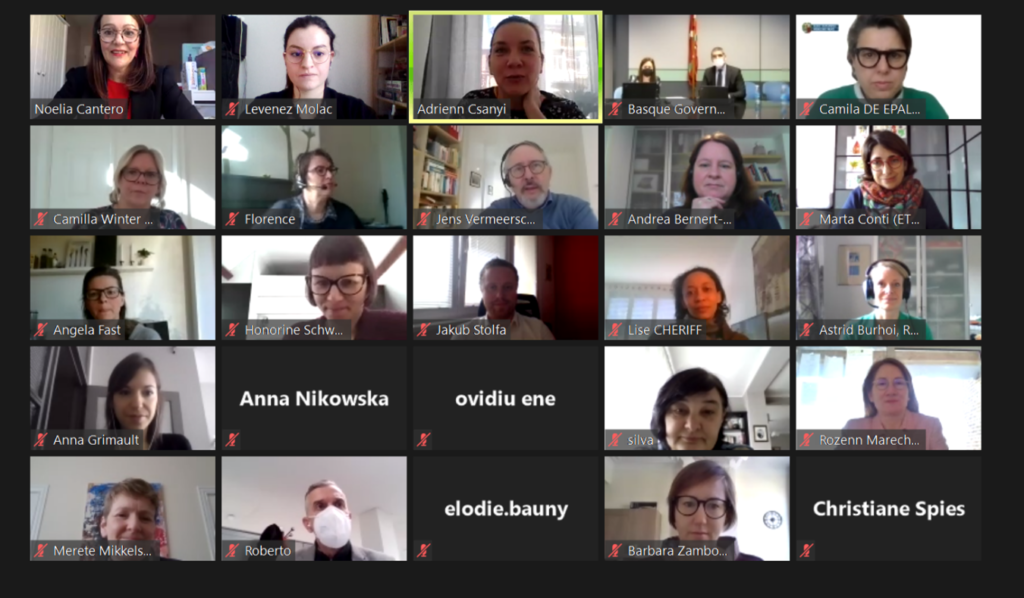Region’s engagement in the Pact for Skills: EARLALL and its Member Regions met with the European Commission
09/03/2021

On 5 March 2021, EARLALL Secretariat and representatives from its Member Regions, associate members and regions that are considering membership (Basque Country, Brittany, Catalonia, Trento, Baden-Württemberg, Asturias, Varaždin, Västra Götaland , Vestland, Borås , GO!, Movetia, Occitanie, Pays de la Loire and Centre val de Loire) met online with several experts of the European Commission (DG EMPL, DG GROW) to discuss about regions’ involvement in the Pact for Skills.
The Pact for Skills, recently launched in November 2020 is a central element of the European Skills Agenda. The goal of the Pact is to bring together industries, employers, social partners, public authorities, employment agencies and education and training providers. By bringing these parties together, it aims at leveraging the impact of investing in upskilling and reskilling for all people in working age across the European Union.
Both private and public organisations, including regional or local partnerships and industrial ecosystems or cross-sectoral partnerships, can join the Pact for Skills. All the stakeholders who want to take part in it need to sign the Charter and its principles:
- Promoting a culture of lifelong learning for all
- Building a strong skills partnership
- Monitoring skills supply/demand and anticipating skills needs
- Working against discrimination and for gender equality and equal opportunities
EARLALL Member Regions showed high interest in taking part in the Pact for skills during the meeting, as many of their projects are directly linked to the reskilling and upskilling of workers. Moreover, regional authorities, given their proximity to the territories, are best placed to involve local stakeholders to take part in the Pact.
The meeting was chaired by Adrienn Csanyi (European Commission, DG EMPL, Unit E2 Skills and Qualifications), responsible for the Pact, and opened by Rikardo Lamadrid (EARLALL Presidency and Director General for New Technologies and Advanced Learning at the Basque Vice-Ministry of VET). Ms. Csanyi and Anna Nikowska (European Commission, DG EMPL) presented the Pact for skills and the possible involvement of regions in it. Indeed, the experts insisted on the need of a joint European action to build a strong partnership in reskilling and upskilling so that employers that are struggling to invest are able to find workers with the required skills.
According to the Commission, 70% of companies report that the lack of skills hampers their investment. Ms. Csanyi and Ms. Nikowska highlighted the fact that the Pact encourages joint proposals by regions and cities for recovery strategies regarding upskilling and reskilling in the value chains of key ecosystems. The Pact for Skills provides to the signatories a Networking Hub to support the technical help, along with a Knowledge Hub to share best practices and a Guidance & Resources Hub to identify financial possibilities. The Pact of Skills is structured around the 14 industrial ecosystems identified by the European Commission (DG GROW), being the Automotive one the best developed example of cooperation at regional level and of the setting up of regional hubs.
The automotive sector and tourism: key examples of cooperation
Jakub Stolfa (Programme manager and Assistant professor at VSB – Technical University of Ostrava, and Partner and Consultant at SCOVECO) and Marta Conti (Advisor, Trade and Parliamentary affairs at European Tyre and Rubber Manufacturer’s Association) presented the work that they are carrying out under the Automotive Skills Alliance (ASA). The ASA implementation is running since January 2021 with more than 65 stakeholders from all over Europe with a key focus on regional and cross-regional cooperation. The goal of this initiative is to build a responsive workforce through the upskilling and reskilling of employees within the automotive sector. ASA has put a solid emphasis on better targeted training offers, linked to the specific needs identified at regional level.
Ovidu Ene (European Commission, DG GROW) presented another of the industrial ecosystems within the Pact: the Skills Partnership in Tourism. This ecosystem represents a sector dramatically touched by the consequences of the COVID-19 pandemic, in which clear support strategies and input from different stakeholders is requested. The area of investments concerning the Skills Partnership in Tourism concerns: soft skills (cross-cultural communication, languages, customer handling), digitalisation (digital awareness, e-marketing and social media), business planning (entrepreneurial and business management, crisis management) and sustainability (environmental management skills, sustainable forms of tourism that considers well-being of local communities). The European Commission welcomes the participation of local and regional authorities in this partnership to boost the dialogue and mobilise the main stakeholders in the sector.
Our dialogue with the European Commission on the Pact for Skills will continue as increasing the participation of regional and local authorities in the Pact is key to achieve a sustainable and inclusive recovery in Europe.
Useful links
- More information about the European Pact for Skills
- Presentation by Adrienn Csanyi and Anna Nikowska, European Commission (DG EMPL)
- Presentation by Jakub Stolfa, University of Ostrava
- Ovidu Ene, European Commission (DG GROW)

